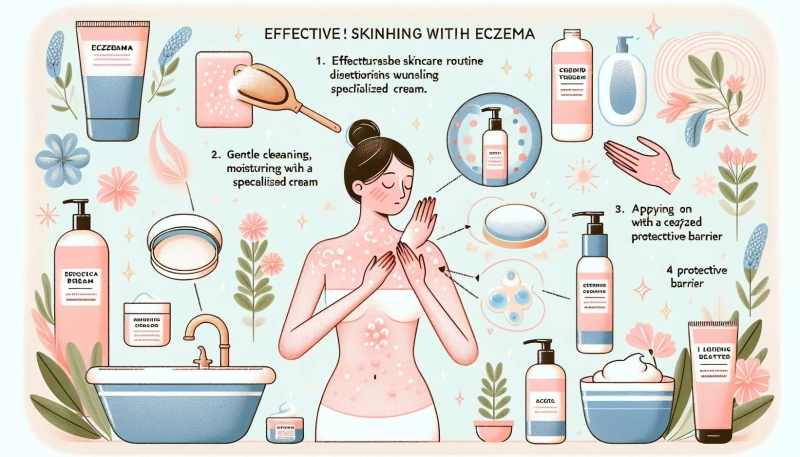Ultimate Guide to an Effective Skincare Routine for Eczema

Struggling with itchy, inflamed eczema? This guide offers a comprehensive approach to crafting an effective skincare routine, backed by science and dermatologist advice, to soothe symptoms and improve your quality of life.
Eczema, or atopic dermatitis, can be a challenging skin condition, marked by itchy, inflamed, and sometimes painful skin. Crafting an effective skincare routine for eczema is not just beneficial; it's crucial. This guide walks you through comprehensive and proven approaches to manage eczema through a dedicated skincare routine. Our aim is to arm you with knowledge and techniques, backed by scientific research and dermatological best practices, to reduce flare-ups, enhance skin barrier function, and improve your quality of life.
Understanding Eczema and Its Impact on Skin
Eczema affects the skin's ability to retain moisture, leading to dryness, breakage, and a compromised skin barrier. This deficiency makes skin more susceptible to infection and allergens, which can exacerbate the condition. Understanding the underlying mechanisms of eczema is the first step in developing a skincare routine tailored to nurturing and protecting sensitive skin.
Key Components of an Effective Skincare Routine for Eczema
1. Gentle Cleansing
Opting for a gentle, non-foaming cleanser that doesn't strip the skin of its natural oils is paramount. Cleansers designed for sensitive skin, free from irritants such as alcohol, fragrance, and sulfates, can help maintain the skin's natural barrier and prevent drying.
2. Deep Hydration
Moisturizing is a non-negotiable part of the skincare routine for eczema. After bathing or cleansing, apply a thick, fragrance-free moisturizer to damp skin to lock in moisture. Creams and ointments tend to be more effective than lotions for eczema-prone skin.
3. Barrier Repair
Products containing ceramides, cholesterol, and fatty acids are excellent for repairing and restoring the skin's barrier. These ingredients mimic the natural composition of the skin's own lipids and help to seal in moisture and protect against irritants.
4. Anti-inflammatory Treatments
Topical treatments that have anti-inflammatory properties can help reduce itchiness and redness associated with eczema. Ingredients such as colloidal oatmeal, licorice extract, and niacinamide have shown effectiveness in easing inflammation.
Recommended Daily Skincare Routine Steps
- Morning: Start with a gentle cleanse, followed by a moisturizer that includes SPF to protect eczema-prone skin from sun damage.
- Throughout the Day: Keep the skin hydrated. Reapply moisturizer as needed, especially to hands after washing.
- Night: Repeat cleansing and apply an intensive moisturizer or an overnight treatment designed for sensitive skin to support skin repair.
Adjusting this routine based on your skin's daily needs and response to products is crucial. What works for one person may not work for another, making personalized care essential.
Critical Considerations
1. Identifying and Avoiding Triggers
Common eczema triggers include harsh soaps, tight clothing, stress, and environmental factors like pollen and pet dander. Awareness and avoidance of personal triggers are essential in managing eczema effectively.
2. The Role of Diet and Lifestyle
While not directly a part of a skincare routine, diet and lifestyle have significant impacts on eczema. A balanced diet rich in anti-inflammatory foods, adequate hydration, and stress management practices can support skin health from the inside out.
When to See a Dermatologist
If your eczema is severe, not responding to over-the-counter treatments, or if you're experiencing frequent infections, it's critical to consult a dermatologist. They can prescribe medications, recommend tailored skincare routines, and provide guidance on managing flare-ups effectively.
Conclusion
Developing a mindful skincare routine for eczema involves choosing suitable products, recognizing and avoiding triggers, and making informed lifestyle choices. With consistent care, it's possible to manage the symptoms of eczema and achieve healthier, more comfortable skin. Remember, the key is patience and consistency. As understanding and treatment for eczema continue to evolve, staying informed and adaptable in your skincare approach will serve you well.




















